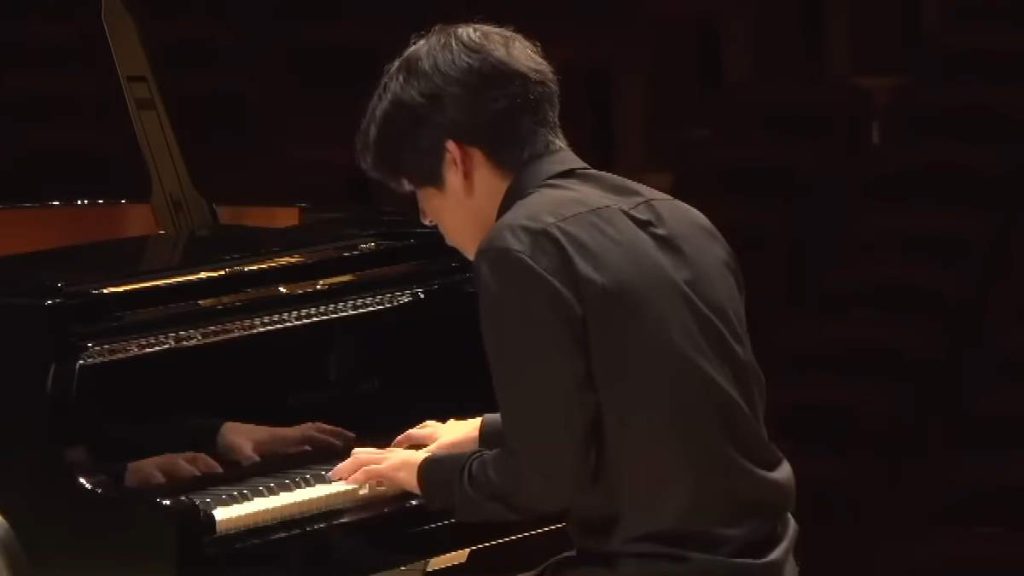The legendary pianist of the 20th century, Sviatoslav Richter performs Frédéric Chopin’s Études Op. 10 (Nr. 1, 2, 3, 4, 6, 10, 11, 12) and Études Op. 25 (Nr. 5, 6, 8, 11). This performance was recorded in London in 1989.
Frédéric Chopin’s Études Op. 10
Frédéric Chopin’s Études, Op. 10, composed between 1829 and 1832, is a set of twelve solo piano pieces that combine technical demands with deep musical expression. These études are among the first to be written with both artistic and technical merit, making them foundational to modern piano repertoire.
Each étude addresses specific technical challenges while showcasing Chopin’s innovative use of harmony, melody, and form. They are known for their emotional depth, ranging from lyrical to virtuosic, and have influenced many composers and pianists. Chopin’s Op. 10 not only serves as excellent practice material for developing pianists but also stands as a significant contribution to 19th-century Romantic music.
Program
With start times in the video:
00:26 Étude in C major, Op. 10, No. 1 “Waterfall”
This étude focuses on rapid right-hand arpeggios, requiring fluidity and control. Its cascading arpeggios create a sense of flowing water, hence the nickname “Waterfall.”
02:38 Étude in A minor, Op. 10, No. 2 “Chromatique”
Known for its chromatic scale passages, this étude demands precision and agility from the right hand, with rapid finger movements across a wide range of keys.
04:12 Étude in E major, Op. 10, No. 3 “Tristesse”
Featuring a beautiful, lyrical melody in the right hand, this étude emphasizes expressive playing and cantabile style, often called “Tristesse” for its melancholic character.
08:06 Étude in C-sharp minor, Op. 10, No. 4 “Torrent”
This piece involves rapid left-hand passages and wide leaps, requiring both hands to play intricate, fast-moving parts simultaneously, creating a torrent-like effect.
10:48 Étude in E-flat minor, Op. 10, No. 6
A study in legato playing and expressive phrasing, this melancholy piece requires smooth, connected playing and subtle dynamic control.
14:01 Étude in A-flat major, Op. 10, No. 10
This étude focuses on chromatic scales and requires smooth playing, presenting a bright and flowing character throughout.
16:07 Étude in E-flat major, Op. 10, No. 11 “Arpeggio”
Known for its arpeggiated left-hand figures, this étude requires fluidity and control, with a lyrical melody intertwined with rapid arpeggios.
17:52 Étude in C minor, Op. 10, No. 12 “Revolutionary”
Composed during the November Uprising, this passionate étude features powerful left-hand runs and a dramatic right-hand melody, symbolizing the struggle and intensity of the revolution.
Études Op. 25
Frédéric Chopin’s Études, Op. 25, composed between 1832 and 1836, are a set of twelve piano studies that, like his earlier Op. 10, blend technical challenges with artistic depth. These études are integral to piano pedagogy and performance, demonstrating Chopin’s innovative approach to piano technique and his ability to infuse technical exercises with rich musicality.
Each piece in this collection addresses specific technical aspects while showcasing Chopin’s expressive range and compositional prowess. The Op. 25 études are celebrated for their poetic qualities, intricate textures, and profound emotional impact.
Program
With start times in the video:
21:17 Étude in E minor, Op. 25, No. 5 “Wrong Note”
Known for its unusual dissonances and playful nature, this étude involves rapid shifts and finger substitutions, emphasizing accuracy and dexterity.
24:29 Étude in G-sharp minor, Op. 25, No. 6 “Thirds”
A study in double-note technique, this piece focuses on playing thirds with both hands, requiring strength and evenness in execution.
26:28 Étude in D-flat major, Op. 25, No. 8 “Sixths”
Focusing on double-note passages in sixths, this étude requires smooth and excellent hand coordination, creating a bright and sparkling texture.
27:43 Étude in A minor, Op. 25, No. 11 “Winter Wind”
Featuring a relentless cascade of rapid right-hand notes over a left-hand melody, this piece requires endurance, control, and a vivid, stormy expression.

Related: Chopin – Winter Wind [Anna Fedorova]
Sources
- Études (Chopin) on Wikipedia
- Études, Op. 10 (Chopin, Frédéric) on the International Music Score Library Project website
- Études, Op. 25 (Chopin, Frédéric) on the International Music Score Library Project website
- Chopin: Scherzo No. 3 [İlyun Bürkev] - September 14, 2024
- César Franck: Violin Sonata [Argerich, Capuçon] - September 8, 2024
- Beethoven: Piano Sonata No. 23 “Appassionata” [Anna Fedorova] - September 7, 2024
